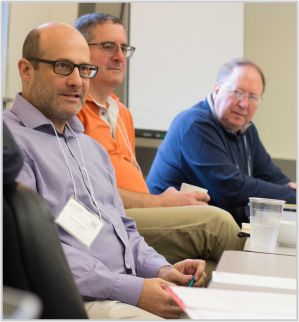September 2019
DIMACS is delighted to announce that Dr. David Pennock will become the next Director of DIMACS, starting in January of 2020.
Pennock is currently a Principal Researcher at Microsoft. During his distinguished career, he was a founding member of three corporate basic research labs. Most recently, he was the founding Assistant Director of Microsoft Research NYC, leading the lab and serving on the global MSR leadership team for six years.
Pennock’s research, which broadly falls under the umbrella of artificial intelligence (AI), is focused on designing intelligent markets to crowdsource forecasts and improve decision making, often combining human and machine intelligence. Pennock describes himself as an AI researcher working at the interface of economics and computation, with a strong appreciation of the importance of CS theory and related areas of mathematics and their applicability in his own research. Pennock’s research seeks market designs with a strong game-theoretic foundation, a significant data-driven component, and a promise of practical deployment to improve society or create a new business.
Pennock is a leader in the economics and computation area of artificial intelligence, serving as Chair of the ACM Special Interest Group on the topic and co-founding and co-editing the journal ACM Transactions on Economics and Computation. He helped to initiate the fields of combinatorial prediction markets and truthful wagering mechanisms and to establish two long-standing workshops – the New York Computer Science and Economics Day and the Sponsored Search Workshop, which is now the Ad Auctions Workshop. Pennock was an early innovator in recommender systems, web analysis, and sponsored search, and he co-authored many influential publications in these areas. His 2005 paper, CROC: A New Evaluation Criterion for Recommender Systems, received a Test of Time Award honorable mention at SIGIR (the International ACM SIGIR Conference on Research and Development in Information Retrieval) in 2014. Some of his recent work has explored truthful wagering mechanisms. He and his colleagues invented the double clinching auction (see 2017 paper) and discovered a remarkable one-to-one correspondence between wagering mechanisms and fair-division allocation algorithms like the famous cake-cutting protocol (see 2019 paper).
 Associated with DIMACS since his days as a postdoc, Pennock has served on the DIMACS Executive Committee since 2012, been a frequent seminar speaker for the DIMACS Research Experiences for Undergraduates program, and was co-organizer of the DIMACS Workshop on Markets as Predictive Devices (Information Markets) in 2005. This DIMACS workshop, in fact, led Pennock and others to establish a Prediction Markets Workshop in 2007.
Associated with DIMACS since his days as a postdoc, Pennock has served on the DIMACS Executive Committee since 2012, been a frequent seminar speaker for the DIMACS Research Experiences for Undergraduates program, and was co-organizer of the DIMACS Workshop on Markets as Predictive Devices (Information Markets) in 2005. This DIMACS workshop, in fact, led Pennock and others to establish a Prediction Markets Workshop in 2007.
With his Ph.D. in Computer Science from the University of Michigan, his undergraduate degree from Duke in Physics, and research interests that draw inspiration from the social sciences, Pennock enjoys reaching across disciplinary boundaries. This is one of the things that attracts him to DIMACS. He says, “Few organizations are as successfully interdisciplinary as DIMACS, which is a good match to my background and beliefs. DIMACS is one of the best centers in the world at bringing people together from many organizations, locations, and backgrounds to spark the creative process. I love the ‘catalyst’ aspect of its mission.”
Pennock appreciates the history of DIMACS and its role in advancing mathematics and computing. Looking ahead, he says, “Formal methods, quantitative approaches, and algorithms will always be at the core of what DIMACS does.” As Director, he will nurture these traditional areas, while growing activities in areas that align with his own strength. In a message to DIMACS members, he said, “Three areas that I plan to emphasize to start are AI, ethics, and economics; we are already making exciting progress in these directions. These areas will add to upcoming activities in data science with the launch of a new TRIPODS institute, ongoing special foci in optimization and complexity, continuing activities through CCICADA, and many exciting educational programs.”
One of his goals is for DIMACS to lead the way toward a future where machines are intelligent, data-driven, ubiquitous, and embedded in society in a thoughtful and responsible manner. This ambition is already taking shape in an upcoming DIMACS Special Focus on Mechanisms and Algorithms to Augment Human Decision Making that he will lead. Describing the program, he says, “The special focus will look at market mechanisms that combine human and machine intelligence, leveraging the strengths of each. Machines are good at tasks that people find hard, repetitive, or dull. People add knowledge that requires general intelligence. The special focus will explore how to modernize organizations, markets, and governments by improving how they collect and combine information to make decisions.”
David Pennock will join Rutgers in January of 2020 as Director of DIMACS and Professor in the Department of Computer Science. Please join us in welcoming him. We are excited about our future under his leadership.
Printable version of this story: [PDF]
References:
A.I. Schein, A. Popescul, L.H. Ungar, and D.M. Pennock, CROC: A New Evaluation Criterion for Recommender Systems, Electronic Commerce Research, 5(1): 51-74, 2005.
R. Freeman, D.M. Pennock, and J. Wortman Vaughan, The Double Clinching Auction for Wagering, ACM Conference on Economics and Computation, 2017.
R. Freeman, D.M. Pennock, and J.Wortman Vaughan. An Equivalence between Wagering and Fair-division Mechanisms, AAAI Conference on Artificial Intelligence, 2019.


